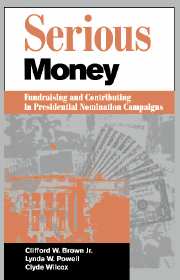Book contents
- Frontmatter
- Contents
- List of figures and tables
- Acknowledgments
- 1 Introduction
- 2 The regulatory environment
- 3 The contributor pool
- 4 Mobilizing the pool: Methods of soliciting campaign funds
- 5 Candidate resources
- 6 Recruiting contributors and solicitors: Candidate and individual decisions
- 7 Conclusion
- Appendix I The 1988 and 1992 presidential nomination surveys
- Appendix II 1988 and 1992 survey items used in the analysis
- Notes
- Bibliography
- Index
Appendix II - 1988 and 1992 survey items used in the analysis
Published online by Cambridge University Press: 27 August 2009
- Frontmatter
- Contents
- List of figures and tables
- Acknowledgments
- 1 Introduction
- 2 The regulatory environment
- 3 The contributor pool
- 4 Mobilizing the pool: Methods of soliciting campaign funds
- 5 Candidate resources
- 6 Recruiting contributors and solicitors: Candidate and individual decisions
- 7 Conclusion
- Appendix I The 1988 and 1992 presidential nomination surveys
- Appendix II 1988 and 1992 survey items used in the analysis
- Notes
- Bibliography
- Index
Summary
1988 SURVEY ITEMS USED IN ANALYSIS
Issue and ideological items
The issue and ideological items were asked in three different formats, as follows:
Agree–disagree items:
For the first set of items, respondents were given the following five choices: agree strongly; agree somewhat; neither agree nor disagree; disagree somewhat; disagree strongly. These items included
Reducing the budget deficit should be the next president's top priority.
The next president should raise taxes to help balance the budget.
Free trade is important, even if it results in the loss of U.S. jobs.
This country would be better off if it returned to the gold standard.
The government should provide a program of health insurance for those not currently insured.
Mandatory death penalty for murder should be the law.
Defense spending should be reduced.
We should have mandatory prayer in the public schools.
The government should not regulate what adults read, even if that includes pornography.
Child care is the parents' responsibility; government should not be involved.
Students or teachers should not be required to pledge allegiance to the flag.
Businesses should have the right to test any employee for drug use whenever they choose.
The government should prohibit abortion.
Seven- point issue and ideological scales
The second set of items used a seven- point scale. Many of those items were replicated from the National Election Study (NES) items. On the liberalism–conservatism scales each of the seven scale points was labeled as shown below. On the other items, only the end points were labeled, as is the practice in the NES for these items.[…]
- Type
- Chapter
- Information
- Serious MoneyFundraising and Contributing in Presidential Nomination Campaigns, pp. 152 - 160Publisher: Cambridge University PressPrint publication year: 1995



